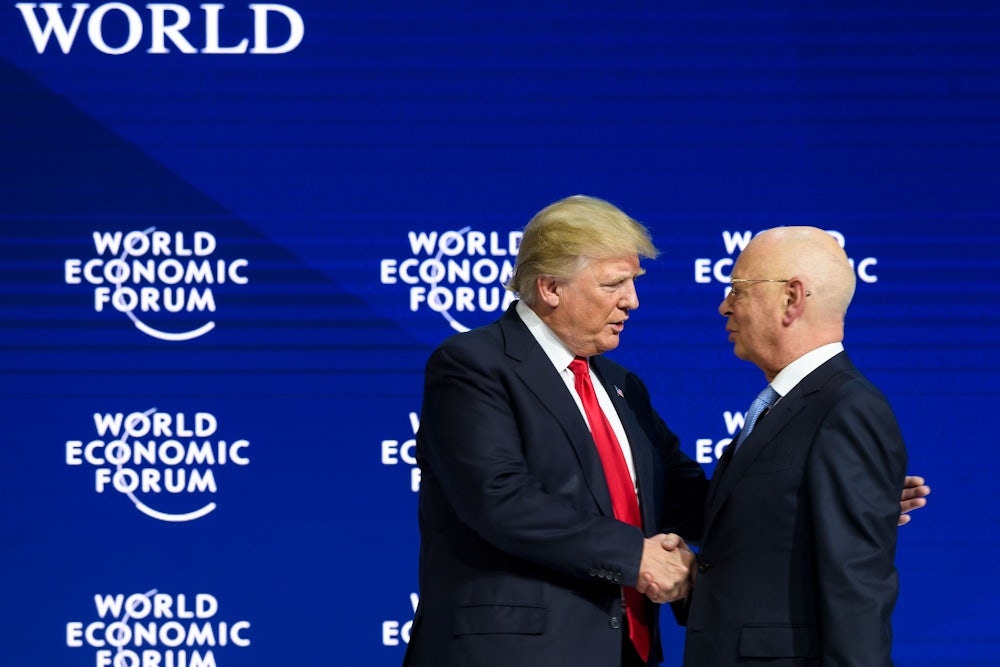In theory, Donald Trump’s trip to Davos should have been a disaster. After all, Trump campaigned as a populist, national-sovereignty-loving politician who was opposed to everything the globalists at Davos claim to cherish: free trade and an American-led international order. But in reality, Trump’s trip to Davos has been one of the singular triumphs of his presidency.
The Washington Post reported, “Trump received, and reveled in, a mostly warm reception from the CEOs and international finance titans at Davos, many of whom praised the tax-cut package that Trump shepherded through Congress last month.” The New York Times noted that a year ago, when Trump’s election victory was fresh news, “the globalists meeting in this mountaintop getaway reeled in shock, panicked that his campaign promises meant the end of the movement they had nurtured for decades.” But seeing how Trump has actually governed has taught the world’s economic elite that the president’s vaunted populism is good for their bottom line. “A year later, many of the business and political elites remain dismissive of him, privately rolling eyes and using words like ‘madman,’ but there was excitement about economic growth, and the tax cuts and regulatory rollback he has ushered in,” the Times added.
Going further, CNN reported that Trump has received a “rock star reception” at Davos:
To be sure, there have been a few discordant notes sounded: George Soros gave a speech describing Trump as a “danger to the world.” There was booing during Trump’s speech when he derided “fake news.” And there were a few visible walkouts during the speech, like Columbia University media and technology professor Anya Schiffrin:
Anya Stiglitz, one of the few people to protest Trump’s speech: “Trump is a very dangerous demagogue and it’s really important not to normalize him.” pic.twitter.com/RqSU6YMtmb
— Miriam Elder (@MiriamElder) January 26, 2018
Despite these dissident voices, Davos was not enemy territory for Trump. Rather, it was Mar-a-Lago in the Swiss Alps, a place where Trump could comfortably bask in the admiration of his fellow plutocrats.
Trump’s Davos trip doesn’t just illustrate how fraudulent his reputation as a populist is, it also speaks to a growing theme of his presidency: There’s a bifurcation between global-elite opinion and popular opinion on Trump. While the world’s ruling class has learned to live with Trump, and perhaps even figured out how to profit from him, he’s immensely unpopular around the world.
As Pew reported last summer:
Donald Trump’s presidency has had a major impact on how the world sees the United States. Trump and many of his key policies are broadly unpopular around the globe, and ratings for the U.S. have declined steeply in many nations. According to a new Pew Research Center survey spanning 37 nations, a median of just 22% has confidence in Trump to do the right thing when it comes to international affairs. This stands in contrast to the final years of Barack Obama’s presidency, when a median of 64% expressed confidence in Trump’s predecessor to direct America’s role in the world.
Trump’s general unpopularity is such that, earlier this month, he had to cancel a planned visit to one of America’s closest allies, the United Kingdom, for fear of the protests his visit would incite. As Bloomberg reported, “Amid warnings that Trump would face protests in the streets when he arrived, he told the prime minister he would not be coming to the U.K. until she could promise him a warm welcome.”
Something of the same division between elite and public opinion exists within the United States as well: Democrats in Congress are still trying to find ways to work with Trump, a tendency that is being reined in by the deep animosity toward him from the base of the party.
In an interview with LobeLog, University of Chicago political scientist John Mearsheimer explained this bifurcation as a difference between those who examine Trump’s actions and those who look to his words. “What people in positions of responsibility in other countries are doing these days is not listening to what Trump says, but looking at what he does,” Mearsheimer noted. “And if you look at what he does, he’s nowhere near as threatening or as dangerous to them as his rhetoric might imply. I think, however, when you talk about publics around the world, it’s quite clear that the people in other countries who are listening to him and mainly concentrating on his rhetoric, are really scared.”
There’s an element of truth to this, but other factors explain the division as well. The global elite, witnessing Trump’s easy susceptibility to flattery—as in his relations with Chinese President Xi Jinping—has every incentive to try and glad-hand the president. Clubby personal diplomacy no doubt comes easy to the super-rich, but personal diplomacy means little to most people around the world. Rather, it reinforces the sense that Trump is someone who likes to chum around with tyrants and billionaires.
Further, to ordinary people outside the United States, as well as many within, Trump’s signature policies are personally threatening: He’s offering the world a more militaristic and brutal foreign policy, tougher borders, and fewer environmental protections. But the Davos set doesn’t mind these policies so much—as long as they also include tax cuts and deregulation. That’s a reasonable trade-off for the 1 percent, since their wealth can shield them from any dire consequences that result from Trump’s actions.
Trump might have campaigned as the enemy of the globalists, but his true nature now stands revealed: He is Davos Man incarnate. Both Trump and Davos have shown us who they really are.
